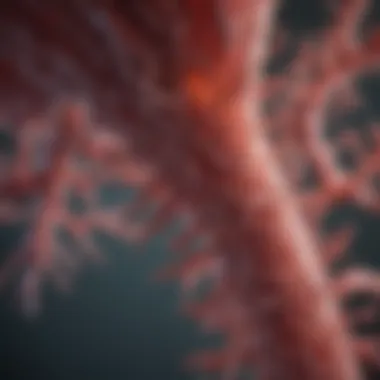APC Mutation in Colon Cancer: Mechanisms and Implications


Intro
The study of APC mutations in colon cancer reveals essential insights into the biology of this disease. APC, short for Adenomatous Polyposis Coli, plays a pivotal role in regulating the Wnt signaling pathway. Disruption in APC function is a significant factor in the progression of colon cancer. Understanding how these mutations contribute to tumorigenesis is crucial for both research and clinical applications. The research presented here focuses on examining these mechanisms in greater detail and analyzing their implications.
Research Overview
Summary of Key Findings
APC mutations are notably prevalent in familial adenomatous polyposis (FAP) and sporadic colon cancer cases. These mutations lead to aberrant Wnt signaling, resulting in uncontrolled cellular proliferation and tumor growth. The key findings indicate that:
- Genetic Alterations: APC mutations alter the degradation process of beta-catenin, a critical component of the Wnt signaling pathway.
- Tumor Progression: The accumulation of beta-catenin in the nucleus drives oncogenic transcriptional programs, escalating tumorigenesis.
- Therapeutic Potential: Targeting pathways that interact with APC may present new strategies for therapy, particularly in aggressive forms of colon cancer.
Research Objectives and Hypotheses
The primary aim of this research is to elucidate the underlying mechanisms by which APC mutations foster colon cancer. The main objectives include:
- Identifying specific mutations and their effects on Wnt signaling.
- Exploring the role of APC in cell cycle regulation and apoptosis.
- Evaluating current diagnostic tools and their efficacy in detecting APC mutations.
The hypothesis posits that APC mutations lead to a cascade of molecular events that significantly contribute to colon cancer. By validating this hypothesis, we can enhance understanding and develop targeted interventions.
Methodology
Study Design and Approach
The research adopts a multidisciplinary approach combining genetic studies, molecular biology, and clinical samples. A cohort of colon cancer patients with known APC mutations has been established to enhance the understanding of this genetic alteration.
Data Collection Techniques
Data collection includes:
- Genomic Sequencing: Used to identify specific mutations in the APC gene.
- Immunohistochemistry: Employed to analyze protein expression levels of beta-catenin in tissue samples.
- Clinical Surveys: Gathered to correlate mutation data with patient outcomes and treatment responses.
Understanding APC mutation mechanisms in colon cancer can lead to improved diagnostic insights and targeted therapies, transforming patient care.
This study's findings will contribute significantly to the existing body of knowledge and open avenues for future research and clinical advancements.
Foreword to Colon Cancer and Genetic Mutations
Understanding colon cancer involves exploring not just the disease itself but also the genetic foundations that contribute to its development. In this article, we will discuss the crucial role of mutations, particularly in the APC gene, a central player in the pathogenesis of this malignancy. By illuminating the mechanisms underlying these genetic interruptions, we can appreciate how they influence tumor growth and behavior.
Colon cancer is one of the leading causes of cancer-related deaths globally. It arises from a combination of environmental variables and genetic predispositions. Genetic mutations disrupt regular cellular processes, allowing for unchecked cell growth and tumor formation. Knowing the significance of these mutations, especially in the context of the APC gene, is imperative for both researchers and clinicians alike.
By focusing on genetic mutations, we can uncover the layers of complexity that characterize colon cancer. The implications for diagnosis, treatment, and prognosis are profound. A deeper understanding of the relationship between APC mutations and cancer progression could guide future research, potentially leading to more effective prevention strategies and therapies.


Overview of Colon Cancer
Colon cancer originates in the large intestine, often starting from polyps, which are abnormal growths on the intestinal lining. These polyps typically develop over many years through a series of genetic changes. The progression from benign polyps to malignant tumors is influenced by both hereditary and sporadic factors, making early detection vital.
Several risk factors are linked to colon cancer, including age, family history, diet, and sedentary lifestyle. Symptoms can range from changes in bowel habits to unexplained weight loss or rectal bleeding. These signs may indicate advanced disease, highlighting the importance of regular screening methods like colonoscopies, especially for high-risk groups.
Role of Genetic Mutations in Cancer
Genetic mutations can be classified broadly into two categories: inherited and acquired. Inherited mutations, such as those found in the APC gene, can significantly increase the risk of developing colon cancer at a younger age. These mutations can disrupt normal cellular functions, leading to increased cell division and tumor formation.
Acquired mutations, on the other hand, occur as a consequence of environmental influences, lifestyle factors, and age. The accumulation of these mutations over time often dictates tumor behavior and patient outcomes.
In colon cancer, certain genes are consistently implicated in its development. The APC gene stands out due to its tumor suppressor functions. When APC is mutated, it can no longer effectively regulate cell growth, often resulting in the initiation of cancer. Thus, understanding the role of genetic mutations is essential for developing targeted strategies in cancer prevention and treatment.
The Adenomatous Polyposis Coli (APC) Gene
The Adenomatous Polyposis Coli (APC) gene plays a crucial role in the development and progression of colon cancer. As a tumor suppressor gene, it is responsible for regulating cell growth and maintaining genomic stability. Understanding the APC gene is essential for comprehending how mutations in this gene contribute to cancer development. Its significance cannot be overstated, as APC mutations are frequently observed in both familial and sporadic cases of colon cancer. This article aims to provide insights into the function of the APC gene and the various types of mutations it can undergo.
Function of the APC Gene
The primary function of the APC gene is to control the beta-catenin levels within the cell. Beta-catenin is a key protein involved in the Wnt signaling pathway, which is vital for normal cell proliferation and differentiation. The APC protein forms a complex with other proteins, facilitating the degradation of beta-catenin. When this process is disrupted due to mutations in the APC gene, beta-catenin accumulates in the cell. This accumulation leads to uncontrolled cellular signaling and increased cell growth, contributing to tumorigenesis.
In addition to regulating the Wnt pathway, the APC gene also has roles in maintaining cell adhesion and promoting apoptosis. By enhancing cell adhesion, the APC protein helps prevent excessive cell movement and ensures that cells remain anchored to their environment. Furthermore, its involvement in apoptosis indicates that APC also plays a part in eliminating damaged cells. This multifaceted role highlights how crucial the APC gene is to cellular health and cancer prevention.
Mutation Types in the APC Gene
Mutations in the APC gene can be classified into several types, each with different consequences on its function. The most common types of mutations include:
- Nonsense mutations: These mutations create a premature stop codon, leading to truncated and nonfunctional APC proteins.
- Frameshift mutations: Insertions or deletions of nucleotides result in a shift in the reading frame, which alters the entire amino acid sequence downstream of the mutation. This often produces nonfunctional proteins as well.
- Missense mutations: These substitutions alter single amino acids without creating a stop codon. Depending on their location, these mutations may impair the protein's function or stability.
The nature and location of these mutations influence the severity of the disease. For instance, patients with familial adenomatous polyposis (FAP), a hereditary condition associated with APC mutations, often develop numerous polyps in the colon at a young age. In contrast, sporadic colon cancers typically arise from more diverse mutations affecting various genes, of which APC is a critical player.
Understanding the specific types of APC mutations helps in tailoring diagnostic and therapeutic approaches. By identifying the mutations, clinicians gain insights into the potential disease progression and available treatment options, including targeted therapies that specifically address the underlying genetic changes.
Mechanisms of APC Mutation-Induced Tumorigenesis
The exploration of the mechanisms behind APC mutation-induced tumorigenesis is crucial for understanding colon cancer. APC mutations lead to dysregulation of various cellular processes, setting the stage for cancer development. By delving into these mechanisms, we gain insight into potential therapeutic targets and diagnostic markers that may improve clinical outcomes for patients.
Impact on Wnt Signaling Pathway
The Wnt signaling pathway plays a fundamental role in cell growth, differentiation, and migration. APC's primary function is to regulate this pathway. Mutations in the APC gene disrupt its ability to suppress the Wnt pathway. As a result, uncontrolled activation occurs, leading to enhanced beta-catenin accumulation in the nucleus. This accumulation drives the expression of target genes that promote cell proliferation while inhibiting apoptosis. Consequently, this proliferation contributes to the formation of adenomas, which can progress to carcinomas over time.
Cell Proliferation and Survival


APC mutations significantly affect cell proliferation and survival. Tumor cells exhibit characteristics such as increased growth rates and resistance to programmed cell death. The dysregulated Wnt signaling, as mentioned earlier, allows the overproduction of transcription factors that support these traits. This gives mutant cells a growth advantage over normal cells. Understanding how these mutations encourage survival can unveil strategies for intervention. Targeting the pathways activated in these cells may lead to developing treatments that reduce tumor growth and improve patient prognosis.
Cell Adhesion and Migration
Another key aspect of APC mutation-induced tumorigenesis is its effect on cell adhesion and migration. APC is involved in maintaining cell-to-cell adhesion and the integrity of epithelial tissues. Mutations lead to the loss of function, resulting in decreased adhesion between cells. This promotes a migratory phenotype, allowing cancerous cells to invade surrounding tissues and potentially metastasize. Investigating how these changes in adhesion properties occur can provide insights into metastasis mechanisms, which are important for cancer progression.
"Understanding the mechanisms of APC mutation is indispensable for unraveling the complexities of colon cancer development and progression."
Clinical Implications of APC Mutations
APC mutations hold significant importance in colon cancer, affecting various clinical aspects from diagnosis to treatment strategies. Understanding these implications can enhance patient management and improve outcomes. This section discusses how detecting and interpreting APC mutations can influence clinical practices, providing clearer pathways for patient care.
Diagnosis of APC Mutations
Genetic Testing Technologies
Genetic Testing Technologies have transformed how we diagnose APC mutations associated with colon cancer. These technologies include methods like next-generation sequencing (NGS), which allows for comprehensive gene analysis. One key characteristic of NGS is its ability to detect multiple mutations simultaneously, making it a preferred choice for clinicians. This comprehensive testing means that not only can APC mutations be assessed, but other cancer-related mutations can also be identified, leading to a more precise understanding of a patient's genetic makeup.
The unique feature of NGS is its high throughput and accuracy. With low chances for human error, it provides reliable results which clinicians can depend on for decision-making. However, a disadvantage includes the cost and technical expertise required to interpret complex data.
Screening Guidelines
Screening Guidelines for APC mutations are crucial for early risk identification and management in individuals with familial adenomatous polyposis (FAP) and sporadic colon cancer cases. The guidelines recommend starting screenings at a younger age, often in the late teens, which is a crucial aspect for timely intervention. Early detection can significantly improve prognosis and survival, enhancing the overall effectiveness of treatment.
A notable feature of these guidelines is their adaptability based on family history and personal risk factors. This personalization helps in creating a tailored approach to screening. However, one downside is that many patients may remain unaware of their genetic risks, leading to late diagnoses and missed opportunities for preventive care.
Prognostic Value of APC Mutations
Correlation with Disease Progression
APC mutations have established correlations with disease progression in colon cancer. Research shows that specific mutations can predict the aggressiveness of the cancer. This aspect is essential for prognostic assessments, guiding treatment decisions and patient counseling. A key characteristic is the association of certain mutations with advanced stage disease, which is valuable for understanding a patient’s outlook.
The unique attribute of this correlation lies in its potential to inform treatment planning. By identifying high-risk patients early, oncologists can implement more aggressive treatment regimens. However, it is also important to note that not every APC mutation correlates with the same level of risk, which can complicate prognostic interpretations.
Markers for Treatment Response
APC mutations serve as markers for treatment response, especially in targeted therapies. The presence of certain mutations can indicate which therapies are likely to be effective, helping to avoid ineffective treatments. This feature of predicting therapy response is beneficial for preserving patient quality of life and optimizing treatment plans.
The unique advantage lies in the ability to personalize therapy based on APC mutation status, leading to better outcomes. However, reliance on such markers can be limiting, as they may not account for other compensatory pathways tumors may utilize, potentially leading to resistance.
Understanding the clinical implications of APC mutations is crucial for enhancing patient management in colon cancer, paving the way for more tailored and effective interventions.
Current Research Trends in APC Mutation Studies


The study of APC mutations remains at the forefront of colon cancer research. These mutations are crucial in understanding the disease's progression and its underlying genetic framework. Current trends focus on elucidating the complex interactions between the APC gene and various signaling pathways, with a particular emphasis on the Wnt pathway.
Broader implications extend to how these findings translate into effective clinical applications. Researchers are continuously exploring new avenues to better diagnose and treat patients, enhancing their prognosis. Additionally, there is a significant interest in leveraging APC mutation status to tailor personalized treatment strategies.
Recent Advances in Understanding APC Functions
Recent studies have revealed insights into the multifaceted functions of the APC protein beyond its traditional roles. One notable area of focus has been its involvement in cell migration and adhesion. Understanding these mechanisms helps pinpoint how APC mutations disrupt cellular processes, ultimately contributing to tumorigenesis.
Moreover, researchers have employed advanced techniques like CRISPR gene editing. This has enabled them to study the implications of specific APC mutations in vitro and in vivo. With these innovative approaches, there is potential to identify new targets for therapeutic intervention, ultimately leading to more effective treatments for colon cancer.
Emerging Therapeutic Strategies
Targeted Therapies
Targeted therapies represent a significant advancement in the treatment of diseases related to APC mutations. These therapies focus on specific molecular targets involved in cancer pathology, offering a more personalized treatment approach. The key characteristic of targeted therapies is their selectivity, which aims to minimize damage to healthy tissues compared to traditional chemotherapy.
One unique feature of targeted therapies is their ability to inhibit growth signals and restore normal apoptotic pathways. This specificity is beneficial as it often results in fewer side effects, making treatment more tolerable for patients. However, some limitations exist, including potential resistance mechanisms that can develop over time.
Immunotherapy Approaches
Immunotherapy has gained traction as a promising avenue in treating colon cancer associated with APC mutations. This approach harnesses the body's immune system to identify and destroy cancer cells more effectively. A key characteristic of immunotherapy is its ability to adapt and enhance immune responses toward tumor antigens, leading to a sustained attack against cancer cells.
One unique feature of immunotherapy is the use of immune checkpoint inhibitors, which enhance T-cell activation. This strategy has shown substantial benefits in some patients, although it may not be universally effective. Challenges such as immune-related adverse effects and tumor heterogeneity present hurdles that researchers are working to address.
"Advancements in both targeted therapies and immunotherapy represent critical progress in the ongoing fight against colon cancer. These strategies highlight the potential for personalized medicine in improving patient outcomes."
Epilogue and Future Directions
Addressing the role of APC mutations in colon cancer is crucial for several reasons. The complex mechanisms underlying tumorigenesis reveal how pivotal APC is in cancer biology. Unlike other mutations, APC alterations directly affect fundamental cellular processes, such as cell signaling and proliferation. Thus, understanding these mutations offers vital insights into both the disease's progression and potential treatment avenues.
Future directions in research should concentrate on elucidating the detailed pathways through which APC mutations drive tumorigenesis. This knowledge is essencial for developing targeted therapies. As the field evolves, more emphasis is also needed on longitudinal studies that assess the long-term effects of novel therapies aimed at APC pathways. Furthermore, improving genetic testing technologies will allow better identification of patients at risk, which can enhance early intervention strategies.
"Understanding the mutations in the APC gene can provide key insights into the prevention and treatment of colon cancer."
In addition to clinical implications, future research should explore the role of APC mutations in different stages of colon cancer. Investigating the molecular signatures linked to APC mutations, as well as their interactions with other genetic factors, could reveal combinatorial therapies that enhance patient outcomes. Ultimately, ongoing investigations are imperative for translating these insights into practical applications.
Summary of Key Findings
The research highlights the significant contribution of APC mutations to the initiation and progression of colon cancer. Key findings include:
- APC mutations disrupt the Wnt signaling pathway, leading to uncontrolled cell growth.
- Various mutation types exist, each affecting tumor behavior differently.
- The clinical implications of these mutations extend to diagnostics and treatment response predictions.
These findings underline the necessity of tailoring treatment approaches based on individual APC mutation profiles, thereby improving the personalization of cancer care.
Areas for Future Research
Numerous opportunities for future studies exist, including:
- Investigating novel therapeutic strategies: Exploring drugs that can effectively target downstream effects of APC mutations.
- Understanding the role of environmental factors: Examining how lifestyle and environmental influences interact with APC mutations to affect disease progression.
- Longitudinal studies: Focusing on the outcomes of patients with varied APC mutations over extended periods, thereby assessing the implications on treatment efficacy and overall survival.
Such areas of exploration have the potential to significantly advance our understanding of colon cancer, ultimately aiding in the effective management and treatment of patients impacted by APC mutations.















